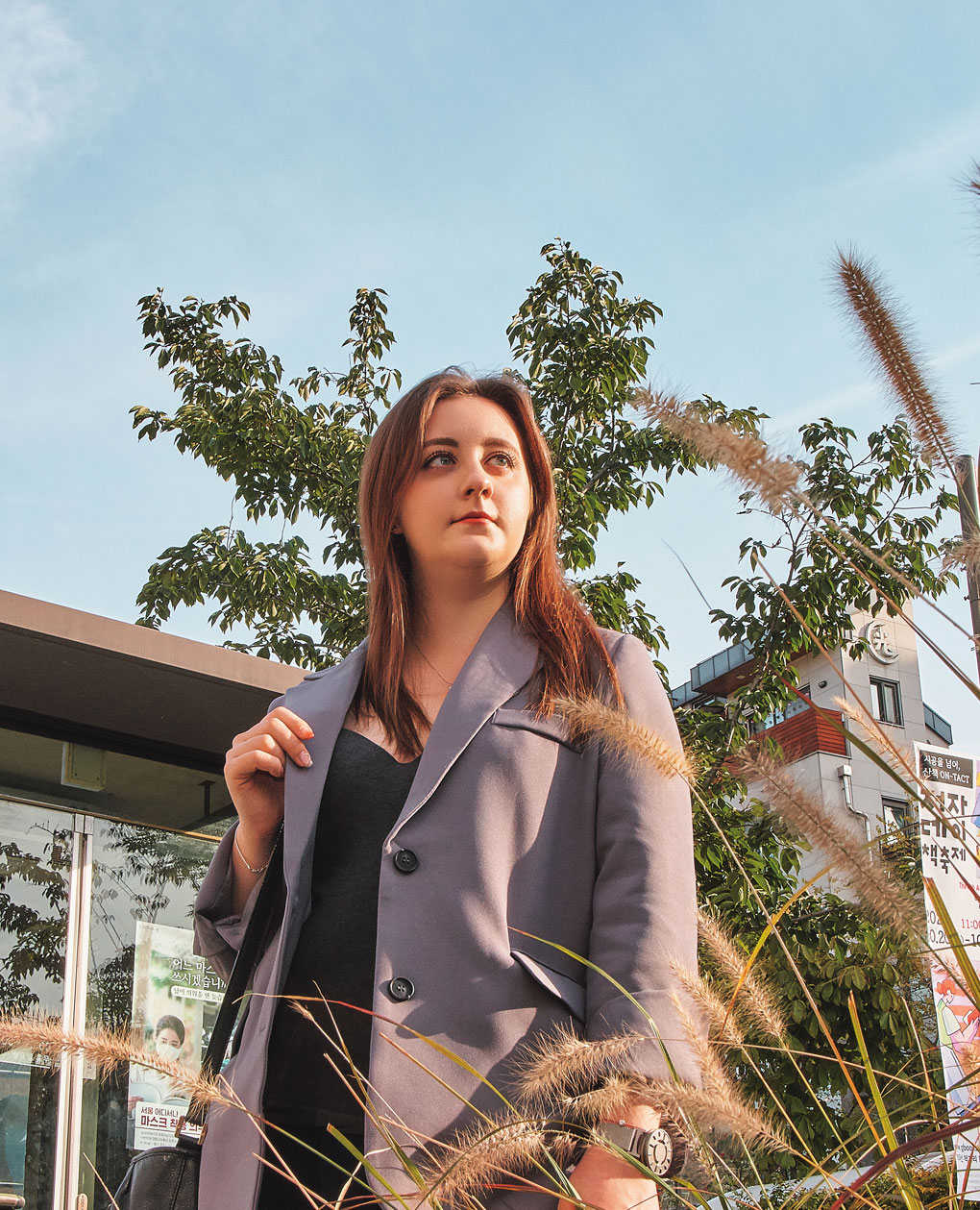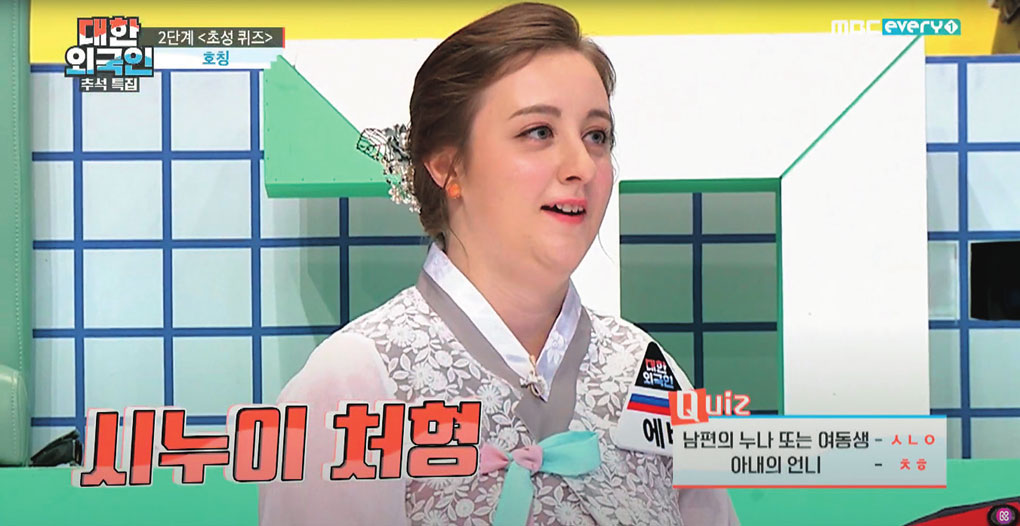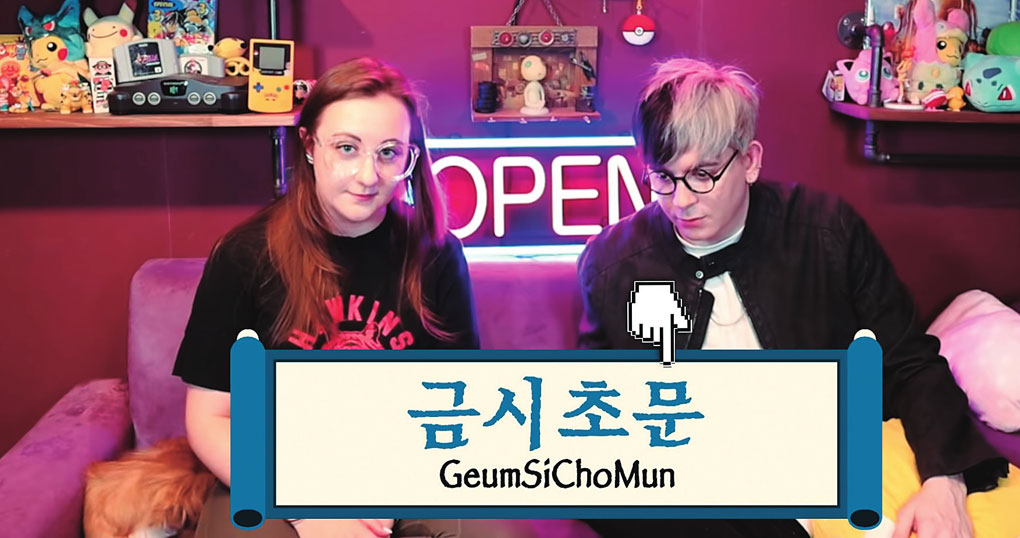Born in Russia but having spent much of her life in Korea, Eva Lee can make Koreans sit up and think about their native language. She aspires to one day host a TV program of her own and introduce the people of Korea and Russia to one another’s literature.

Russian-born Eva Lee has spent much of her life in Korea after first coming here as a child with her mother. She is a translator, interpreter and frequent guest on television and radio.
Eva Lee is constantly being told that she speaks Korean better than a Korean. YouTube clips featuring her are followed by dozens of such comments. A regular on the TV show “South Korean Foreigners” (Daehan Oegugin) on MBC every 1 and “Park Myung-soo’s Radio Show” on KBS Cool FM, Eva can make people forget that she is Russian.
But being fluent in two languages sometimes means being comfortable with neither and being comfortable with two cultures sometimes means being at home with none. For Eva, an epiphany of sorts came when she entered the Graduate School of Interpretation and Translation at Hankuk University of Foreign Studies (HUFS) in 2017. Faced with the task of interpreting a three-minute text for the first time, she said she had a menbung (mental breakdown) moment when she felt she knew neither Korean nor Russian. “I don’t know what I heard,” she says.
Eva’s first encounter with Korea was when her mother was invited to teach piano here. This all took place through Korean missionaries based in Khabarovsk, where Eva and her mother lived. The connection was made through her maternal grandmother, who attended a Korean church. This is how Eva came to attend elementary school in Uiwang, Gyeonggi Province as the only foreigner in her class. “I wasn’t so much an oegugin [foreigner] but an oegyein [alien],” she recalls. But after six years in Korea, returning to Russia presented a kind of culture shock. Then, after another six years, she was enrolled in a Korean university on a government scholarship and experienced reverse culture shock.
Culture Shock Both Ways
Dealing with a mix of cultures and languages culminated in Eva undertaking a degree at a Russian university at the same time as she majored in media studies at HUFS. “I would spend four months in Korea and then go back to Russia for one month. Whenever I went to Russia, everything was always the same. And when I came back to Korea, something had always changed,” she says. “Going back and forth, I had a hard time for a while. But I came to terms with it. The experience has made me less sensitive and it’s easier for me to accept new things.”
After finishing her undergraduate degree in 2015, Eva married a former classmate and took his family name, Lee. This was mostly for convenience, she says. Her maiden name was Kononova and people would – unintentionally, of course – come up with weird and wonderful variations.
The name suits her; after talking to Eva Lee for a while, she seems like the Korean girl next door. She grew up watching “Bangwi Daejang Ppungppungi” (Fart Master Ppungppungi), a popular children’s TV show, and even shares the experience of faithfully waiting for her boyfriend while he spent two years doing his military service. Noting that he was stationed in Namyangju on the outskirts of Seoul, she says, “Actually, I found it rather easy. We could talk on the phone and I saw him once or twice a month.” Then, with that dry humor a lot of Korean women use when speaking of their husbands, she adds, “I don’t think I wanted to see him that often. And now we see too much of each other.” The COVID-19 pandemic has prompted the couple, both homebodies by nature, to spend even more time inside these days.
If not for the pandemic, Eva would probably be busier doing interpretation work. With no international events being held for now, she’s working more on translations. Interpretation, she feels, is rather stressful because there are no opportunities to revise or fix mistakes. “I feel good when I’ve finished, but kind of empty,” she says. “With translation, there’s the stress of making the deadline and never being satisfied. Later you look at your work and think, ‘Why did I write that?’ But at least you have a visible end result.”

Eva is a regular on “South Korean Foreigners,” a quiz show featuring foreigners living in Korea. She has made her mark with her general knowledge and fluent Korean. © MBC every 1

Eva teaches Korean in an appearance on “The World of Dave,” a YouTube channel operated by David Kenneth Levene, Jr. from the United States. Viewers were amazed at the way she understands even the finer nuances of the Korean language. © Captured from YouTube
Literary Translation
Eventually, Eva would like to tackle literary translation. She is now in an online class at the Literature Translation Institute of Korea with hopes of translating into Russian Park Min-gyu’s “Pavane for a Dead Princess,” among other works, as well as introducing Russian books to Korea. Few in the field are so equally proficient as to take on the task, but Eva says she’s comfortable with both Russian and Korean and translates and interprets both ways. Musing over the matter, she says, “Now that I’ve lived longer in Korea than in Russia, maybe Korean is more comfortable. It depends on who I’m speaking to.”
While she says interpretation and translation give her a sense of achievement, it was broadcasting that brought Eva into the public eye. Actually, one of the reasons she worked so hard on her language skills is her original dream of being a television host. Her first television appearance was on the linguistic quiz show “Korean Language Competition” (Urimal Gyeorugi). She won first prize pitting her skills against other foreigners. When she entered university, she worked as a presenter on the TV Chosun program “Morning at Gwanghwamun.” Despite the title, she wasn’t exploring downtown Seoul; the show took her all over the country, first to introduce regional foods and later to experience various kinds of jobs.
Thankfully, she has the language ability to draw out real conversation with Koreans and non-Koreans alike. But she feels that she’s still young and hasn’t built the network she thinks she needs.
Morning Show
“It was all hard labor, things like fishing for octopus, carrying sacks of flour at a bakery. I also had some very Korean experiences like transplanting rice seedlings,” Eva reminisces. Other memorable experiences include feeding wolves and diving with sharks.
Aside from learning that Korea, despite its small size, has very different regions, or that “wolves are more afraid of humans than we are of them,” Eva realized that on television everybody needs to act a bit. A morning show reporter, she found, has to be extraordinarily bubbly and energetic. “I realized I was more sedate than I thought, so when needed, I sort of ‘acted’ the part,” she says.
This and her language skills have prompted her to think a lot about the phenomenon of foreigners being welcomed on Korean television, at first for simply speaking the language. “In Russia, there are very few foreigners on TV,” she says, pointing out that you have to do something aside from speaking what is, after all, the audience’s native language. “In Korea, if you speak the language, you are given the opportunity. It’s something special here and something to be thankful for, of course.”
But sometimes she wonders if it would be better if she were not so fluent. “If you’re cute and make mistakes, or speak in dialect, or have some particular pronunciation quirk – people seem to find that more fun.” In the end, broadcasting is entertainment. Eva believes that “to continue in broadcasting, you have to work hard anda character for yourself.”
While Eva may wonder if there’s any point in sounding exactly like a Korean, audiences embrace her “character,” that is, the foreigner who speaks like a native. This carries some baggage. “People think I’m really smart. But speaking well and being smart are different things. I can speak the language because I did the training. But I don’t know about history, tradition and so on. I can only talk about what I’ve experienced. So I study hard and try to fill the gaps for myself,” she says.
Filling in the Gaps
Eva still dreams of hosting a program, but is looking now to YouTube where the entry barriers are lower and the restrictions fewer, enabling more diverse content. The world has moved on and moving to another country is not as dramatic as it once was. After Eva married, she never thought, Well, now I’m here forever. “I thought, ‘Well, we’re here for now.’ My husband wants to try living in Russia some time. Or, who knows, we could live in yet another country altogether,” she says.
The foreign community as she knows it has more to offer than simple praise and comparisons of people, food and culture. “For example, some people can help students think about what they want to do with their lives, or a person in business can inspire others with their experience,” she says, quickly voicing some ideas. Thankfully, she has the language ability to draw out real conversation with Koreans and non-Koreans alike. But she feels that she’s still young and hasn’t built the network she thinks she needs.
Another ive is to help promote relations between Korea and Russia. This year marks the 30th anniversary of the two countries’ diplomatic ties. Several events were planned but have been canceled due to the pandemic. For now, Eva translates a related Instagram feed and does volunteer interpretation for a call center, where she deals with everything from taxi instructions to calming down a person who has locked himself in a toilet booth at the airport.
At 28, Eva has plenty of talent and time to dream. In both languages.
Cho Yoon-jungFreelance Writer and Translator
Heo Dong-wukPhotographer